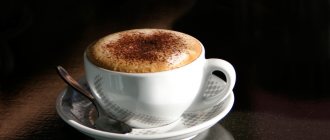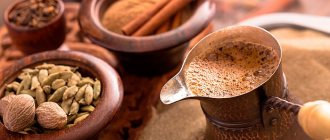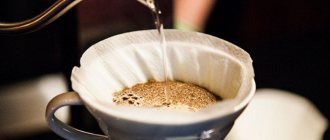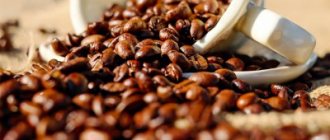The Germans are known to everyone for their pedantry and scrupulousness in all respects.
They place the same high demands on manufacturers. Germans will never part with their money unless they are 100% sure that the product is of high quality. The world-famous Stiftung Warentest institute, which everyone trusts unconditionally, acts as a tester for all products. Therefore, German coffee is famous throughout the world for its highest quality and natural taste. In Germany, coffee is highly valued; people drink it here all day long. Traditionally, the average German's morning begins with a cup of aromatic and invigorating coffee, which is accompanied by the freshest pastries. Some prefer exclusively espresso, while others prefer cappuccino or latte. Everyone has their own tastes, but everyone invariably agrees that coffee is the ideal drink for the morning.
At lunchtime, you can find a large number of people sitting on a bench in the park or running about their business with cups of coffee in their hands. After work, relaxing coffee with alcohol is very popular.
If you want to try really high-quality coffee, then you should try German. This drink will not leave anyone indifferent, as it is produced according to ancient recipes using the best technologies. Vast experience and a reverent attitude towards coffee, as well as strict quality control, make German coffee impeccable. The best German coffees are listed below.
Coffee Gorilla
Gorilla
– selected high-quality bean coffee for restaurants and bars from Germany. It consists of selected Arabica and Robusta varieties, roasted and packaged under the strict supervision of German professionals. Experts say that this type of coffee is the most striking representative of German quality. This coffee has a persistent aroma, a long aftertaste and a complete absence of acid or bitterness. In addition to all this, people are attracted by the bright packaging, corporate identity and original name. Gorilla coffee is presented on the market in the following varieties:
Gorilla Cream Bar
– a unique blend of coffee beans collected in the highlands of Colombia and Brazil. 10% Arabica content and 90% Robusta content makes this coffee very soft and delicate. The presence of creamy foam and persistent aroma are the main advantages of this type. The cost of 1 kg of packaging is approximately 870 rubles.
Gorilla Espresso Crema No. 1
– high-quality selected Arabica beans, roasted using special latest technologies. The taste of this coffee is soft, with notes of hazelnut, which sets it apart from other varieties. The cost of coffee for 1 kg is 945 rubles.
Gorilla Shumly
– a completely new original coffee made from 100% Arabica coffee. High-quality and real delicate taste and aromatic foam will appeal to many. This coffee is especially good with cream, cinnamon or chocolate. The price for 1 kg is 930 rubles.
Gorilla Super Bar Cream –
A unique blend of Arabica and Robusta beans in equal proportions. Coffee has an unusual taste and aroma of the tropics, which attracts attention. Price for 1 kg - 935 rubles.
History of coffee in Germany
In 1637, Joh. Albrecht von Mandelsloh, in "Eastern Journey", mentions: "... the black liquid of the Persians, called Kahwe, must be consumed hot."
Coffee began to be drunk in Germany around 1670. The drink was presented to the court of the Grand Elector of Brandenburg in 1575. An English merchant opened the first coffee house in Hamburg in 1679-80. Regensburg followed suit in 1689; Leipzig in 1694; Nuremberg in 1696; Stuttgart in 1712; Augsburg in 1713; and Berlin in 1721. In the same year (1721), King Frederick William I granted rent grants to foreign coffee houses in Berlin.
For many years, English merchants were the main suppliers of coffee to customers in northern Germany, while the southern region was supplied by Italy.
For history buffs, it will be interesting to know the location of coffee houses in old Berlin. "Royal" - Behrenstra?e; "Widow Doebbert" - Stechbahn; "City of Rome" - Unter-den-Linden; "Arnoldi" - Kronenstra?e; "Miercke" - Taubenstra?e; "Schmidt" - Poststra?e.
Later, Philipp Volk opened a Jewish coffee house on Spandauerstrasse. During the time of Frederick the Great (1712-1786), the number of coffee shops in the central part of Berlin was limited, and on the outskirts one could find many tents serving coffee.
The first periodical, The New and Curious Coffee House, was published in Leipzig in 1707 by Theophilo Georgi. The title read: “A new and wonderful coffee house, once Italian, now opened in Germany.” In fact, it was the first coffee house in Germany, where a lot of gossip was discussed. At the beginning of the activity, the first owner of the house proclaimed:
In 1721, Leonard Ferdinand Meisner published a comprehensive German treatise on coffee, tea and chocolate in Nuremberg.
During the second half of the eighteenth century, coffee spread into homes and began to replace foods such as warm beer and stew that were served for breakfast.
At the same time, coffee met with some opposition in Prussia and Hanover. Frederick the Great became angry when he learned how much money was spent paying foreign merchants for green coffee beans. And he tried to limit coffee consumption by introducing restrictions on the “quality” of the drink. However, soon all German institutions had their own roasters, coffee makers and coffee sets. Many wonderful cups and plates of excellent porcelain made in Meissen, used on special occasions, are well preserved in the collections of museums in Potsdam and Berlin.
Many doctors took part in a campaign against coffee, the main argument of which was the claim that women who drank coffee would experience premature birth. At the same time, “Coffee Cantata” (1732) by J. S. Bach was a kind of protest against the widespread slander against coffee.
On September 13, 1777, Frederick the Great issued a manifesto on coffee and beer, a curious document that stated:
Over time, beer returned to its place of honor, and coffee continued to be a luxury item available to the rich. Soon there was a turning point in this situation; even Prussian army regulations could not withstand the coffee ban. In 1781, seeing that the court circle, the officers of his army and the family nobility could not resist drinking coffee, Frederick the Great introduced a monopoly prohibiting the roasting of beans anywhere except in the royal roasters. At the same time, he makes some exceptions for nobles, clergy and government officials; but withdraws all coffee roasting licenses for everyone else. These measures lead to restrictions in the choice of drinks. For the cream of the Prussian Society, special licenses were put into circulation, allowing for their own roasting of coffee. Naturally, everything necessary was purchased from the government at incredibly high prices, which brought Frederick the Great considerable income. In this regard, the possession of such a license for roasting coffee, for its owner, has become a sign of belonging to the upper class. The poorer classes could drink coffee in secret; In addition, coffee substitutes based on barley, wheat, corn, chicory and dried figs appeared in abundance.
Richter's coffee house in Leipzig
This coffee regulation was known as the "Declaration du Roi concernant la vente du cafe brule" and was published on January 21, 1781.
All these regulations required large expenses in administration and supervision of their implementation. To reduce costs, soldiers unable to perform their duties due to injuries were brought into service. Their task included espionage and patrolling the streets of the city day and night in order to sniff out the smell of coffee that spread when roasting beans. In this way, braziers that did not have a special license were tracked down. The spies received a quarter of the value of the confiscated property as a reward. Naturally, the agents’ behavior aroused the hostility of the rest of the population, and they were given the offensive nickname “coffee-smellers.”
Home inspection
The Elector of Cologne, Masimilian Frederick, Bishop of Münster, Duke of Westphalia, on February 17, 1784, issued a manifesto which stated:
This decree was solemnly read from the pulpit and posted in public places and roads. As a result, “informers” and “sniffers” immediately began their work, and all this led to discontent and disorder in Westphalia. In order to somehow soften the situation, indulgences were introduced allowing for 15 kg of coffee. In the end, this whole system collapsed.
While the King of Prussia was implementing a monopoly on coffee, the Duke of Württemberg went his own way. He sold Joseph Suess-Oppenheimer, a not very scrupulous businessman, the exclusive rights to maintain coffee houses in the Principality of Württemberg. Joseph, in turn, began selling individual licenses to open coffee houses at the highest rates, taking full advantage of the opportunity that presented itself. He became the first “coffee king”.
But coffee survived all possible slander and cruel oppression from the government and rightfully took its place as a favorite drink in the heart of the German people.
Coffee house in Germany.
Coffee Impresto
Impresto
– a fairly new, but already well-established German coffee. Ideal modern production technologies and a responsible approach to business ensure German quality. The coffee line is represented by the following varieties:
Impresto Grand Cru –
carefully selected dark roasted Arabica coffee beans. The soft and impeccable taste, lack of bitterness and long, smooth aftertaste make this coffee very popular. The cost of 1 kg of packaging is 1,400 rubles.
Impresto Espresso Gold
– the best Arabica and Robusta beans, medium roasted. This blend has a very multifaceted taste and constantly reveals itself in different ways. At first it is light and fresh, then it becomes denser and thicker with notes of sourness in the aftertaste. The cost of 200 g packaging is 450 rubles.
Impresto Decaf –
Delicious caffeine-free coffee beans. 100% dark roasted Arabica coffee produces rich, vibrant coffee with a delicious aroma. The cost of 200 g packaging is 450 rubles.
Impresto Espresso is 100% Kenyan Arabica, which has a soft taste with a slight sourness and aromatic creamy foam. The main feature of this blend is its long, fabulously pleasant aftertaste. The cost of 1 kg of coffee beans is 1250 rubles.
Impresto Classic –
A blend of Arabica and South American Robusta, dark roasted. The mild taste of the coffee has special piquant notes, which is why this coffee is loved. Light velvet foam also complements the composition well. A 200 g package costs 450 rubles, 1000 g – 1100 rubles.
Berlin melange
Melange coffee drink is an espresso-based mixture with warm frothed milk and whipped cream. But Berlin-style coffee has a completely different composition, which will not leave any connoisseur of unusual combinations of ingredients indifferent.
Required:
- strong brewed coffee, chilled – 1.5 cups;
- cherry juice - 4 small cups (can be replaced with syrup, but in this case a smaller amount will be required due to the concentration and strong sweetness);
- condensed milk - 4 cups.
All ingredients are thoroughly mixed to form a homogeneous mass. This sweet drink is served cold and topped with powdered sugar if desired.
Coffee Dallmeier
Dallmeier
– German coffee for real gourmets who appreciate the best and are used to getting the most out of life. Unusually pure, impeccable taste and stylish packaging attract attention and have a large number of fans. This coffee looks very presentable and is ideal as a gift. This brand is represented on the market by the following types of ground coffee:
Dallmeier Classic
– ground coffee made from pure Arabica beans, carefully selected and roasted to a light golden color. Quite strong and dense, but at the same time soft and aromatic coffee has a low caffeine content. Suitable for brewing in a Turk and preparing in a coffee maker and coffee machine. Offered on the market in a 250 g vacuum bag costing approximately 200 rubles.
Dallmeier Prodomo
– a selected blend of quality Arabica beans grown in India, Guatemala and Ethiopia. This coffee has a special taste, devoid of any bitterness, and a persistent captivating aroma.
Dallmeier Sonderklass
– pure Arabica grown in the wild highlands of Ethiopia. It has a unique pure taste, unlike other varieties. Valued for its low caffeine content and pronounced aroma.
Dallmeier Kilimanjaro
– ground coffee made from African Arabica beans. This type is distinguished by a rich and well-balanced taste with light floral notes.
Dallmeier Neiva
- Colombian Arabica grown in the Andes and Colombia at high altitudes. This blend is distinguished by its rich, persistent aroma and taste, in which you can feel light citrus notes.
Dallmeier Sul de Minas
- single-origin Brazilian coffee, characterized by a pleasant aftertaste and nutty aroma.
Dallmeier Ethiopia –
ground coffee and high-quality Ethiopian Arabica coffee. Freshly brewed coffee has an elegant taste and a light floral aroma.
Dallmeier Standard
– ground coffee of medium roast, devoid of bitterness. Very similar to Italian coffee, but has a softer, pleasant taste.
Dallmayr coffee reviews
Many reviews are devoted to the Dallmeier Promodo line. Coffee lovers prepare it in a Turkish coffee pot and note its very strong taste with sourness and citrus aroma. Consumers also really like the convenient packaging, which has a sticker on the top that needs to be peeled off when opened. The edges of the packaging remain smooth and thanks to this the coffee does not spill out and it is very convenient to scoop it up with a spoon.
Dallmeier Promodo is the most popular line of the brand
They write that when cooking there is a golden foam, the bitterness is also almost not felt. The main thing is not to be distracted while brewing it, because it is forbidden to boil it, since boiling will make the drink unpleasantly bitter.











